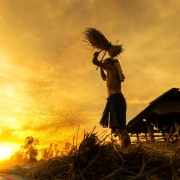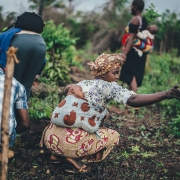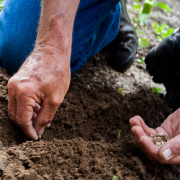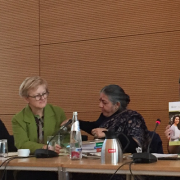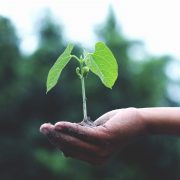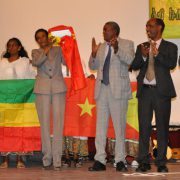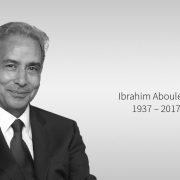First stakeholders’ workshop on “Scaling up Agroecology in the Himalayas”
First stakeholders’ workshop on “Scaling up Agroecology in the Himalayas”
Background
The urgent need to transform our food systems is now widely acknowledged. Climate change, hunger, malnutrition, biodiversity loss and human rights violations are just a few of the challenges that are strongly connected to the way we produce, trade, and consume our food. Agroecology has been globally identified as a key transition pathway that can more holistically address the multifaceted crises we face.
To promote this transition pathway and the food systems approach, IFOAM – Organics International and the World Future Council organized a virtual workshop on “Scaling up agroecology in the Himalayas”. The interactive workshop brought together stakeholders from Bhutan, India and Nepal to discuss the fundamental steps needed to achieve sustainable food systems through agroecology in the Himalayas. Participants exchanged on the current situation of food systems and agroecology in the Himalayas, reflected on the main challenges and opportunities for positive change, explored available policy solutions that support sustainable and healthy agri-food systems, and discussed their potential improvements as well as ideas about additional policy initiatives.
Organizers and supporters
The workshop was organized by the World Future Council and IFOAM-Organics International and was supported by the Deutsche Gesellschaft für Internationale Zusammenarbeit (GIZ) GmbH on behalf of the German Federal Ministry for Economic Cooperation and Development (BMZ)
.
Summary
The lively and engaging two-day workshop took place online on March 14-15, 2023, bringing together 60-70 stakeholders from Bhutan, India and Nepal. Attendees included policymakers, parliamentarians, academia, civil society organizations, private sector representatives and donors.
The first day was dedicated to discussing the main challenges and opportunities of scaling up agroecology in Bhutan, India and Nepal. Sessions were structured around the food systems approach and included an overarching panel discussion and four breakout groups. The breakout sessions covered a range of topics, including resilient, inclusive, and diverse food production systems, sustainability along all food value chains, sustainable and healthy diets, as well as coordination and integration for more policy coherence and consistency.
On the second day, participants built on the discussions from day one and focused on policy dimensions of sustainable food systems, again through panel discussion and breakout groups. They identified and discussed policy solutions that support and hinder sustainable and healthy agri-food systems, discussed policy improvements, exchanged on existing policy gaps and reflected on how policy coherence and consistency could be improved.
Why was this event held? What was the aim? Over the last 10 years, Bhutanese, Indian and Nepalese policymakers have increasingly recognized the need for transition towards sustainable agricultural systems to preserve their natural resources and improve livelihoods for their rural populations. Political commitment has been implemented with varying degrees of intensity, including policies and programs with specific budget earmarks for measures supporting organic farming and agroecology. Recently also other parts of food systems, such as value chains and markets, have received more attention from policymakers. To build on this momentum and to explore how to better scale up agroecological food systems, we organized this two-day interactive stakeholder workshop. The event brought together food system stakeholders from diverse backgrounds, who share a common understanding of the need for change. We created a platform, through which we can collaborate and find innovative solutions to accelerate the transition towards more sustainable food systems based on agroecology. The workshop is part of the project “Scaling up Agroecology in the Himalayas”, which aims to draft a common roadmap and which builds on the digital event “Scaling up Agroecology in the Himalayas Together” held in April 2021 (More information at: https://www.ifoam.bio/news/high-level-policy-experts-discussed-current-situation) as well as on the study “The Mainstreaming of Organic Agriculture And Agroecology in the Himalaya Region” (Available at: https://old.worldfuturecouncil.org/the-mainstreaming-of-organic-agriculture-and-agroecology/). Will there be more such events to come in the future? This workshop is just the first in a series of stakeholder events that will conclude by the end of 2023 with a common roadmap. By scaling up agroecology in the Himalayas, we can create a blueprint for sustainable food systems that can be replicated in other regions around the world. Moreover, this is a crucial step towards ensuring our common future on this planet, acting upon the fact that the health of our ecosystems and the well-being of all living beings are intimately interconnected.
Major takeaways


A Global Call for our Right to a Healthy Environment
The right to a healthy environment is constitutionally protected in over 100 countries. Another 62 countries refer in their constitutions to a healthy environment, but do not make it a right.
Solutions Scaling up Agroecology: Collaborator of PANORAMA platform
We proudly joined the PANORAMA – Solutions for a Healthy Planet initiative by UNEP, UNDP, GIZ, IFOAM – Organics International, IUCN and Rare, as new collaborator.
Report launch: Beyond Fire: How To Achieve Electric Cooking
On the eve of the biggest global “Fridays for Future” youth strike for climate, the World Future Council offers its strong support to the dedicated young people holding leaders accountable for their climate commitments. If we are to meet the 1.5°C target of the Paris agreement bold action needs to happen now.
Scaling Up Agroecology: The Outstanding Practices in Agroecology 2019
After months of intensive research, following an outreach to 2,000 agroecology experts from across the globe, the World Future Council is proud to officially give recognition 15 Outstanding Practices in Agroecology 2019. This is the climax of an intense multistep process including a nomination stage, evaluation stage and deliberation by a panel of global experts. But how does the process take shape? Here is a quick overview.
Keen followers will know that the World Future Council has already been directing much of its research efforts to agroecology. In 2018, the World Future Council organized its renowned Future Policy Award (FPA) on the topic of “Scaling up Agroecology”. After a lengthy and meticulous evaluation period, the winners of the award were announced at a ceremony at the FAO headquarters in Rome in October 2018 and the “100% organic state” Sikkim in India beat 51 nominated policies from 25 countries to take the Gold Award.
Following the same theme as the Future Policy Award, the recognition Outstanding Practices in Agroecology 2019 is a furthered effort to find and honour practices carried forward by diverse individuals and organisations, which enable and support transitions into agroecology. From a total of 77 nominated practices from 44 countries, received by a call to action to 2,000 agroecology experts, 23 made it through to the penultimate, most intensive stage of evaluation. Here, extensive research was carried out and interviews with practice representatives were led. As per the World Future Council’s methodology, the practices were compared with the 7 Future Justice Principles, plus the 10 Elements of Agroecology developed by the FAO.
On the basis of the World Future Council’s evaluation report on the shortlisted practices, a global panel of experts decided which of the practices provide the best solutions in agroecology, in accordance with the evaluation framework. The Jury for the 2019 Outstanding Practices in Agroecology was made up of internationally renowned experts:
- Caterina BATELLO, former Team Leader – Agriculture Department, Food and Agriculture Organization of the United Nations (FAO, in personal capacity)
- Million BELAY, Founder of the MELCA-Ethiopia NGO; Coordinator of the Alliance for Food Sovereignty in Africa (AFSA); Member of the International Panel of Experts on the Sustainable of Food Systems (IPES-Food), Ethiopia
- Gábor FIGECZKY, Head of Global Policy, IFOAM – Organics International, Hungary
- Barbara GEMMILL-HERREN, Senior Associate to World Agroforestry Centre, Nairobi, Kenya; Team member of the Committee on World Food Security HLPE project ‘Agroecological approaches and other innovations for sustainable agrifood systems that enhance food security and nutrition’
- Dr. Franz Theo GOTTWALD, Chairman of the Schweisfurth Foundation; Chairman of the Supervisory Board, World Future Council Foundation
- Shantanu MATHUR, Lead Adviser, Global Engagement and Multilateral Relations Division, International Fund for Agricultural Development (IFAD, in personal capacity)
- Shamika MONE, Research Director, Organic Farming Association in India; Convenor of International Network of Organic Farmers Organizations (INOFO).
In total, 15 practices were granted recognition and celebrated at the event. With the recognition, the World Future Council seeks to raise global awareness for these exemplary practices and speed up action towards just, sustainable and peaceful societies.
18th January 2019 also marks the release of the Position paper (in German) ‘Agrarökologie stärken: Für eine grundlegende Transformation der Agrar- und Ernährungssysteme’ of which the World Future Council and 56 other German and international organisations are official signatories. This paper marks real movement and co-operation in the field of agroecology and its potential to present a real, sustainable alternative to the current global system. The paper features background information, a call of solidarity to action, the necessary steps to move forward and most importantly issues clear demands to the German government.
The recognition is organised by the World Future Council (WFC), in collaboration with the start-up Technology for Agroecology in the Global South (TAGS).
Berlin welcomes the World Future Council into the Bundestag
100% Organic Sikkim, World Future Councillor Vandana Shiva and Director Alexandra Wandel in the German Parliament with Former Minister for Food and Agriculture Renate Künast
On Thursday 29th November, Berlin provided a solace of winter sun after a week of heavy-hanging weather to welcome World Future Councillor and world-renowned environmental activist, Prof. Dr. Vandana Shiva, and the Director of the World Future Council, Alexandra Wandel in the capital’s Bundestag Complex. They were invited by Member of Parliament, Renate Künast, former Minister for Food and Agriculture to discuss the agro-political situation in India, the world’s first 100%-organic state and Gold-winner of the Future Policy Award 2018, Sikkim, as well as the road-map to sustainable global agriculture.
“Sikkim shows that we can turn this around and walk the agro-ecological path.”
Vandana Shiva
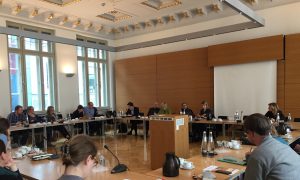 In a simple yet elegant conference room, the Honourable Künast welcomed her guests and 30 audience members from the German Parliament, European environmental institutes and the general public, and opened the discussion. The conversation quickly turned to agriculture in India. As a country whose agricultural face was profoundly transformed under the Green Revolution of the mid-20th Century, India is a notable example of the extreme conflicts and contrasts in the current global food system. Councillor Shiva described the horrors incurred by input-intensive agriculture in the country, which she has repeatedly encountered across four decades of environmental activism. An ongoing suicide-epidemic of hundreds of thousands of debt-ridden farmers, a ‘cancer train’, from the Punjab the Rajasthan, and a youth driven from agriculture and into drug abuse were some of the images she invoked. But the old techniques based on an old reductionist “lego-logic” have been recognised and, by some, reversed in the most radical and inspiring ways.
In a simple yet elegant conference room, the Honourable Künast welcomed her guests and 30 audience members from the German Parliament, European environmental institutes and the general public, and opened the discussion. The conversation quickly turned to agriculture in India. As a country whose agricultural face was profoundly transformed under the Green Revolution of the mid-20th Century, India is a notable example of the extreme conflicts and contrasts in the current global food system. Councillor Shiva described the horrors incurred by input-intensive agriculture in the country, which she has repeatedly encountered across four decades of environmental activism. An ongoing suicide-epidemic of hundreds of thousands of debt-ridden farmers, a ‘cancer train’, from the Punjab the Rajasthan, and a youth driven from agriculture and into drug abuse were some of the images she invoked. But the old techniques based on an old reductionist “lego-logic” have been recognised and, by some, reversed in the most radical and inspiring ways.
“A new knowledge of an old knowledge will be the future of humankind.”
Renate Künast
Over the past 45 years, Sikkim state in the Himalaya Region of India has made the transition to 100%-organic agriculture. Model farms, farmer field schools and a total ban on non-organic food-products have been instrumental in training over 65,000 farmers across 75,000 hectares into sustainable, fully-organic methods. World Future Council Director Wandel described how this unprecedented and entirely-successful transformation has earned the region countless benefits for its farmers and the health and well-being of the local people, as well as a 50% boom in tourism and recognition on the global stage. It is for this tireless work in organic agriculture that Sikkim was awarded the Gold Future Policy Award 2018 at the ceremony in front of 170 heads of state in Rome. Whilst 51 other nominations to the post were extensively researched and other policies from Denmark, Ecuador and Brazil received a Silver recognition, Sikkim’s efforts proved by far by the most exemplary.
“A truly visionary and holistic approach to agriculture.”
Alexandra Wandel
As part of her work with the Parliamentary Group on India, Hon. Künast recently had the opportunity to visit Sikkim experience their ground-breaking (and ground-making) work first-hand. She said she was wholly impressed by how the state uses public money to provide possibilities and livelihood dignity for its citizens in organic agriculture. Their valuing of traditional knowledge fuses with the goodness of the people in an atmosphere of respect for one another and the Earth.
“Sikkim is the light. The struggle must continue.”
Vandana Shiva
After all speakers had passionately shared their experiences and knowledge, the floor was opened up for questions from the audience. The opportunities and risks of digitalisation of agriculture came first, and Councillor Shiva was quick to insist on the stark difference between the right to technology and free internet, versus the forced digitalisation of agriculture. We must remain wary of the dangers of commodification of agricultural data for use by big companies. “Defining the commons in this new context,” said Prof. Dr. Shiva, “is extremely important.”
A second audience member asked how Sikkim was perceived at national level – is this the dawn of an organic India? There certainly exist other positive examples, for example, efforts in the Northern state of Ladakh to become organic. However, at national level, major obstacles remain. Vital here is the ongoing commitment to a sustainable vision by all spheres of society.
“We need a real debate across all of our societies or the future is a dead-end. Only food democracy will feed us in 2050.”
Vandana Shiva
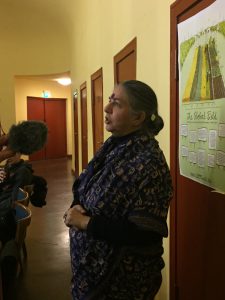 The Director of the World Future Council Alexandra Wandel mentioned that unfortunately not a single German law was nominated for the Future Policy Award on Scaling Up Agroecology and that parliamentarians were invited to have a look at the awarded policies, including the organic policy of Sikkim and also the silver award from neighbouring country Denmark which received the Future Policy Silver Award and has the highest share of organic products in the world.
The Director of the World Future Council Alexandra Wandel mentioned that unfortunately not a single German law was nominated for the Future Policy Award on Scaling Up Agroecology and that parliamentarians were invited to have a look at the awarded policies, including the organic policy of Sikkim and also the silver award from neighbouring country Denmark which received the Future Policy Silver Award and has the highest share of organic products in the world.
The event in the German Parliament came a day after the World Future Council and Councillor Shiva were invited to celebrate Bread for the World’s (Brot für die Welt) 60th anniversary in the German Theatre, and proceeded two exciting events at the historic Babylon Cinema in Berlin’s Mitte district. The first – “Vision for Agriculture 2050” [1] [2] – was a debate between Councillor Shiva, Norbert Lemken, Director Agricultural Policy at Bayer and Prof. Dr. Sonoko Dorothea Bellingrath-Kimura of the Leibniz Centre for Agricultural Landscape Research (ZALF). As the audience outed their respective support and outrage, the debate raged over the science behind chemical inputs, the capacity to feed the world and the morality behind this monumental task. After a short break where audience members could inform themselves with Councillor Shiva’s literature and speak with Liam Innis about the World Future Council and the Future Policy Award, the night continued with the screening of “SEED: The Untold Story” [3]. The film, wherein Councillor Shiva is a protagonist follows the rich and treasured history of Earth’s 12,000 year-old food legacy, which continues to be threatened to extinction by – and fight back against – an all-encompassing agro-industry.
“I think it’s time to bring care, sharing, love, the commons and our brains back into the picture of agriculture.”
Vandana Shiva
[1] https://www.2000m2.eu/de/vandana-shiva-visions-for-agriculture-2050/
[2] https://theworldnews.net/de-news/aktivistin-streitet-mit-konzern-vandana-shiva-vs-bayer-lobbyist
[3] https://www.seedthemovie.com
What is the Future Policy Award 2018 and why is it so important?
What is the Future Policy Award 2018 and why is it so important?
Would you like to know more about the Future Policy Award 2018? Here are some fundamentals:
Every year, the World Future Council honours the best policies that create better living conditions for current and future generations with the Future Policy Award, the “Oscar on best policies”. If that sounds complicated, let us explain to you what it actually means – it’s pretty simple and important: We look at the greatest challenges of humankind and search the world for the best solutions in order to spread them.
A quick Q&A session will help you understand. We also interviewed Poppe Braam, founder of DO-IT (Dutch Organic International Trade) why they support the Future Policy Award this year.
First of all, what’s the Future Policy Award?
The Future Policy Award is the first award that celebrates policies rather than people on an international level. It raises global awareness for exemplary policies and speeds up policy action. Each year, the Councillors of the World Future Council identifies one topic on which policy progress is particularly urgent.
What is the focus this year?
This year’s Future Policy Award is focusing on policies scaling up agroecology. Policies that contribute to the protection of life and livelihoods of small-scale food producers, ensure sustainable food production systems and implement climate-resilient agricultural practices.
Who are the main organisations you partner with this year?
In 2018, the World Future Council partners with the Food and Agriculture Organization of the United Nations (FAO) and IFOAM – Organics International. We received support from Green Cross International, DO-IT – Dutch Organic International Trade and Sekem Group, Egypt.
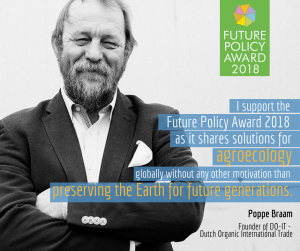
Why does, for instance, DO-IT support Future Policy Award? And why does this Dutch company think scaling up agroecology is so important?
We asked Poppe Braam, who founded DO-IT, an organic food trading company from the Netherlands and he said: “In many countries DO-IT supports farmer transition to certified organic agriculture. Many of them are smallholder farmers, who urgently need more support. This makes local and national policy by governments as well as action by NGOs and agricultural institutes a vital part of this transition. Chemical farming (i.e. today’s conventional agriculture using chemical pesticides and fertilizers) and agroecology are natural opponents. Chemical farming does not only harm nature, but it also harms our health and climate. Moreover, the business of organic farmers is threatened due to levels of pesticide and GMO contamination by wind or water. It is therefore critical to scale up agroecology and policymakers should now step up their efforts.”
What can I do to support agroecology?
Buy organic and agroecological local or regional produce and support thereby family farmers in your region! Just like every raindrop counts towards a river, so does every choice you make in what you consume.
Does the World Future Council need support?
Yes! Now that the Future Policy Award identified and highlighted policy solutions from around world, we need to make them known to policy-makers around the world. We need funding for publishing in-depth policy reports, campaigning events, etc. Every donation will help!
Tigray celebrates Future Policy Award reception
Ethiopia’s Tigray region has received the Future Policy Gold Award this year for their pioneering approach in successfully combatting desertification. Thanks to their policy, the region has made significant progress in restoring its degraded lands and improving its food and water security. The impressive results derived from the major land restoration undertaken by local communities and the regional government, with a unique combination of collective action, voluntary labour and the involvement of young people.
After the Award ceremony on 11th September during the UNCCD summit in Ordos, Inner Mongolia (China), the people of Tigray celebrated the Future Policy Gold Award in their own country. A colorful ceremony was held with 1500-2000 people at Hawelty Martyrs Hall with Tigray’s president, H.E. Abay Weldu, the Speaker of House of Representatives of Tigray region, H.E. Kidusan Nega, H.E. Dr Eyasu Abraha, Minister of Ministry of Agriculture and Natural Resources of Ethiopia and other high-level guests attending, followed by a parade through the Mek’ele, the capital of Tigray.
You are currently viewing a placeholder content from Youtube. To access the actual content, click the button below. Please note that doing so will share data with third-party providers.
In conjunction with the celebration, the University of Mek’ele (MU), in collaboration with Bureau of Agriculture and Natural Resources of the Regional State of Tigray, organised a panel discussion at Desta Hotel, Mek’ele. The event was opened by a welcoming speech by Prof. Kindeya Gebrehiwot, MU’s President. The event was celebrating Tigray’s achievement, and the panelists were discussing how soil conservation towards land fertility and combating desertification can be further improved and maintained for the future.
‘Alternative Nobel’ and World Future Council Mourn Egypt’s Sustainable Development Trailblazer
The Right Livelihood Award Foundation and the World Future Council are deeply saddened by the passing of their Egyptian Laureate and founding member Dr Ibrahim Abouleish.
Dr Abouleish, founder of SEKEM, received the ‘Alternative Nobel Prize’ in 2003 for implementing an innovative business model which combines commercial success with social and cultural development.
Dr Monika Griefahn, Chair of the Foundation’s Board, said: “On behalf of the entire Right Livelihood Award family, I would like to express our deepest condolences to the Abouleish family. Dr Abouleish was a true visionary and trailblazer, and the world is only now starting to catch up with his 40-year-old model of environmentally sustainable, socially just and economically viable development. A joyful and warm-hearted person, he will be greatly missed by all of us and his many colleagues and friends around the world.”
Dr Abouleish founded SEKEM in 1977 as a blueprint for the healthy corporation for the 21st century. Taking its name from the hieroglyphic transcription meaning “vitality of the sun”, SEKEM was the first entity to develop biodynamic farming methods in Egypt and has since broadened its scope to address health, educational and cultural issues. Dr Abouleish also founded the Heliopolis University for Sustainable Development where students study science, technology, arts, engineering and economics with a strong emphasis on sustainability. Over the years, SEKEM and the Heliopolis University played host to meetings of the World Future Council and the Right Livelihood Award Laureates.
“Ibrahim Abouleish’s remarkable initiative SEKEM has brought the desert alive. His Heliopolis University broadens the human mind, challenging modern monocultural thinking. Both show how much more humans can achieve when their work is based on cooperation, solidarity, mutual respect and the common good. His life achievements SEKEM and Heliopolis University are pioneering projects healing people and planet,” said Right Livelihood Award and World Future Council Founder Jakob von Uexkull.
A tireless advocate for sustainable development over five decades, Dr Abouleish has received numerous awards and recognitions in addition to the Right Livelihood Award, including the German Federal Cross of Merit and the United Nations ‘Land for Life’ Award. He was also named a distinguished social entrepreneur by the Schwab Foundation.
According to Islamic traditions, Dr Abouleish will be buried tomorrow, Friday, 16 June at 12:00.
More information:
http://www.rightlivelihoodaward.org/laureates/ibrahim-abouleish-sekem
https://www.worldfuturecouncil.org/councillors/
